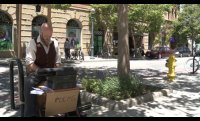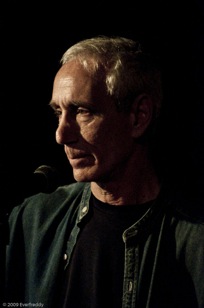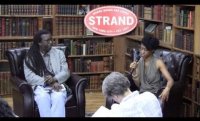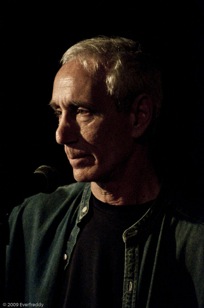Poet and artist Amanda Deutch blogs about her P&W–supported poetry and arts festival, Parachute: the Coney Island Performance Festival. She is the author of four chapbooks: Gena Rowlands, Box of Sky: Skeleton Poems, Motel Drift, and The Subway Series. She is also the recipient of a 2007 Footpaths to Creativity Fellowship to write in the Azores Archipelago.
“Long ago when I was a young man, Coney Island was a favorite spot. At that time, Coney Island had not the reputation it has now.”—Walt Whitman
 I had an idea to have a free community-based poetry and arts festival in Coney Island, a neighborhood on the edge of a city. The festival would incorporate site-specific poetry, free workshops, and readings in a spectacular location. I wanted to create a space where people who had written about Coney Island could come and read and share their words about the place. Coney Island is a neighborhood with a vivid art and literary history, and for me it holds significant family history. My mother’s family lived in Coney Island, on 29th between Mermaid and Surf, for almost twenty years, from the 1920s to the 1950s. Ever since hearing my grandmother Betty first say the words, “Half Moon Hotel,” "Abe Reles," and "meshugana," Coney Island held a poetic resonance for me. I wanted to spend as much time as possible in the place where this Half Moon Hotel once towered with views of the Atlantic and a 150-foot ferris wheel could be landmarked.
I had an idea to have a free community-based poetry and arts festival in Coney Island, a neighborhood on the edge of a city. The festival would incorporate site-specific poetry, free workshops, and readings in a spectacular location. I wanted to create a space where people who had written about Coney Island could come and read and share their words about the place. Coney Island is a neighborhood with a vivid art and literary history, and for me it holds significant family history. My mother’s family lived in Coney Island, on 29th between Mermaid and Surf, for almost twenty years, from the 1920s to the 1950s. Ever since hearing my grandmother Betty first say the words, “Half Moon Hotel,” "Abe Reles," and "meshugana," Coney Island held a poetic resonance for me. I wanted to spend as much time as possible in the place where this Half Moon Hotel once towered with views of the Atlantic and a 150-foot ferris wheel could be landmarked.
Years ago, when I told a good friend my idea to have a festival, he said, “Go for it.” That’s how a lot of things get started in my life, simply with an inspiration and a good friend saying, “Go for it.” I suppose I am lucky to have such good friends and perhaps a little bit of raw nerve. My idea has grown into a nonprofit, Parachute: the Coney Island Performance Festival. I have been able to invite some of the most innovative, incredible, and groundbreaking New York City poets and writers to come and read in Coney Island’s New York Aquarium in front of sea nettle jellyfish—not your typical space for a poetry reading—for an audience that is not your typical poetry audience. Our festival’s audience consists of “regular folks.” We invite mostly native New Yorker writers who are pushing boundaries in the field of poetry. I have had the opportunity, through Poets & Writers’ Readings/Workshops Program, to offer writers a small fee to read and to give a writing workshop during the festival. Brooklyn-based poet Patricia Spears Jones read at the debut festival and lead a free writing workshop for adults at the Mermaid Avenue Library. She enjoyed the experience so much that she came back again and would like to continue leading workshops for us. This symbiotic relationship between artists and the community is just what I was after. Award-winning poet Cara Benson recently said, “How could I ever forget reading there?” I have often thought, "Why can’t poetry readings be in incredible aesthetic environments? Why not have site- specific poetry?" So here you have site-specific poetry!
Many writers reading for the festival have already written prose or poetry about Coney Island. If they haven’t, I encourage writers to create a new Coney Island work especially for Parachute: the Coney Island Performance Festival. Edwin Torres (mentioned in a previous post) came and surprised everyone by reading a rare autobiographical poem, “Coney Island 1969,” that was more narrative than most of his experimental poetry. The poem spoke of his father coming from the Bronx to work as a manager at Nathan’s in Coney Island when he was a little boy growing up in New York City!
This past year we incorporated an audio installation of a poem by the world renowned Bronx born, architect, artist and poet Vito Acconci into the festival. With the help of the Aquarium staff, I placed it outdoors for two evenings in the New York Aquarium’s plaza, beside the penguins. One of the truly spectacular spatial relationships is that Vito’s firm Acconci Studios designed the sculptural art, “Wave-A-Wall,” on the West 8th subway station right across the street! So you could hear his poem “Antarctica” in a small nook beside the penguins while watching the sky change colors right across the street from one of his art commissions.
We also had the ticket-takers who work in the Eldorado Bumper Cars ticket booth on Surf Avenue Trudy and Louis read Coney Island poetry on the mic. Just yesterday Louis stopped me on the street and said, "Hey, when are we doing that again? I got some poetry I want to read and found some poets who would like to get on the mic, too."
Parachute: the Coney Island Performance Festival brings site-specific poetry, installations, symbiosis, and local New York City writers waxing poetic about Nathan’s—all for less than the price of a hot dog. It's free!
Photo: Cara Benson, Amanda Deutch, and Edwin Torres.
Support for Readings/Workshops in New York City is provided, in part, by public funds from the New York State Council on the Arts and the New York City Department of Cultural Affairs, with additional support from the Louis & Anne Abrons Foundation, the Axe-Houghton Foundation, The Cowles Charitable Trust, the Abbey K. Starr Charitable Trust, and the Friends of Poets & Writers.






 Several events commingled in my head last weekend. On June 2, 2013, I attended the poetry reading at Charles F. Lummis Home, El Alisal, which opens Lummis Day each year in Highland Park, California. (The reading is
Several events commingled in my head last weekend. On June 2, 2013, I attended the poetry reading at Charles F. Lummis Home, El Alisal, which opens Lummis Day each year in Highland Park, California. (The reading is 
 I am happy to have this opportunity, as the June Readings/Workshops Writer in Residence, to give something back to Poets & Writers. I have been the beneficiary of much largesse from P&W,
I am happy to have this opportunity, as the June Readings/Workshops Writer in Residence, to give something back to Poets & Writers. I have been the beneficiary of much largesse from P&W,  I had an idea to have a free community-based poetry and arts festival in Coney Island, a neighborhood on the edge of a city. The festival would incorporate site-specific poetry, free workshops, and readings in a spectacular location. I wanted to create a space where people who had written about Coney Island could come and read and share their words about the place. Coney Island is a neighborhood with a vivid art and literary history, and for me it holds significant family history. My mother’s family lived in Coney Island, on 29th between Mermaid and Surf, for almost twenty years, from the 1920s to the 1950s. Ever since hearing my grandmother Betty first say the words, “Half Moon Hotel,” "Abe Reles," and "meshugana," Coney Island held a poetic resonance for me. I wanted to spend as much time as possible in the place where this Half Moon Hotel once towered with views of the Atlantic and a 150-foot ferris wheel could be landmarked.
I had an idea to have a free community-based poetry and arts festival in Coney Island, a neighborhood on the edge of a city. The festival would incorporate site-specific poetry, free workshops, and readings in a spectacular location. I wanted to create a space where people who had written about Coney Island could come and read and share their words about the place. Coney Island is a neighborhood with a vivid art and literary history, and for me it holds significant family history. My mother’s family lived in Coney Island, on 29th between Mermaid and Surf, for almost twenty years, from the 1920s to the 1950s. Ever since hearing my grandmother Betty first say the words, “Half Moon Hotel,” "Abe Reles," and "meshugana," Coney Island held a poetic resonance for me. I wanted to spend as much time as possible in the place where this Half Moon Hotel once towered with views of the Atlantic and a 150-foot ferris wheel could be landmarked.